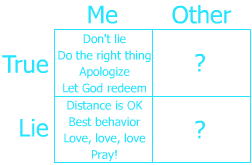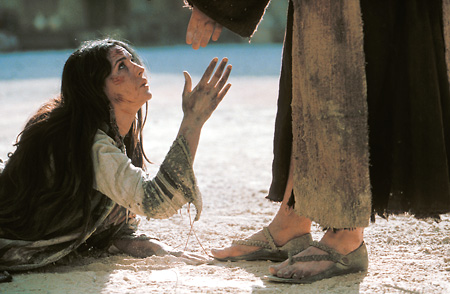Gordon Myers
Articles on Life, Truth, Love, Computers, and Music
Lifting others out of scandal
My last two posts have been part of a series on Biblical Models for Handling Controversy. I broke it down into four categories in a sort of "Punnett Square" style. A controversy can either be about you, or someone else. The one accused can be accused legitimately or falsely (see diagram). Then I examined the first two cases by providing Biblical ideas, reinforced with quotations from Mary Baker Eddy.

If you were looking forward to reading four posts in this series, I apologize, as this is the final post. That's because when someone else is at the heart of a scandal, the Biblical advice is the same whether they're guilty or not! More on that in a moment.
The first lesson on what to do when controversy has arisen which you are a witness to, but not the cause of, is to slow down and withhold judgment. Don't lash out with knee-jerk reactionary comments; first make sure you've got all the facts. And always consider that you could be the one who's mistaken. This is said succinctly by the writer of Proverbs: "Fools vent their anger, but the wise quietly hold it back."
Suppose you have been patient, careful, and the evidence clearly shows the offending party was wrong. Then what? Now you get to condemn them, right? No. Even if someone is legitimately in the wrong, the Bible recommends to try and redeem the situation rather than condemning it. Here's a story to illustrate.
Once upon a time, a woman cheated on her husband, was caught while doing it, and was dragged out into the town square in front of a man named Jesus. The men who dragged her out there had their own ulterior motives for doing so -- they wanted to show everyone that Jesus wasn't as good of a church leader as they were -- so they angrily asked what should be done with the woman. Keep in mind, at the time adultery meant you could be stoned to death.
Jesus' first response was to not respond at all. He ignored the men and played tic-tac-toe. But more than just pretending he didn't hear them, I think he was using that time to pray and listen for God's direction, rather than be swept up in emotion. He finally responded by forcing the men to examine their own behavior rather than the woman's. He said, "Let the one among you who has never sinned throw the first stone at her." One by one they all left. And he didn't throw a stone, either.
He told her, "I do not condemn you. Now go and sin no more." This meant that he didn't let her off the hook for the bad behavior; he was quite clear that what she had done needed to stop. But he separated the behavior from who she was, and focused on redeeming the person more than condemning the misdeed. Interestingly, he couldn't stop the controversy from happening in the first place, and to some extent he let her feel the sting of her own actions. But he also didn't let things stay there. He showed that Christ comes to lift us up, not to drag us down with drama and criticism.

In that case, the cause for controversy was legitimate. Other times, it's not. The fact that you don't know is all the more reason to remain calm and don't take things personally. Even when an issue seem deeply personal, don't make a big drama out of it. It's still better to walk away from the situation for a while, than to lash out emotionally.
Consider the story of Joseph, husband of Mary. His fiancée told him she was pregnant, but he knew well they hadn't slept together. I see him as a man who had been trying his best to do things the right way. They were waiting until marriage, and keeping God at the center of their relationship. So I can only imagine the shock and disappointment he would've felt upon learning that his wife-to-be was carrying someone's child.
Did he yell and scream at her? Or turn violent? Or drag her out into the town square for judgment? No, instead: "Joseph, being a just man, and not willing to make her a public example, was minded to put her away privily." Or as another translation puts it: "he decided to break his engagement quietly." He didn't respond by immediately telling all his Facebook friends how awful Mary had been to him, or spouting off vitriol. He kept calm, kept it in, and quietly went to God with the problem.
This is such a powerful lesson, when you think about it. I stand in awe of Joseph's quiet strength. Eddy puts it this way: "We must love our enemies in all the manifestations wherein and whereby we love our friends; must even try not to expose their faults, but to do them good whenever opportunity occurs." Joseph refused to expose what seemed like huge, hurtful faults on Mary's part. And this mindset made him receptive to the miraculous revelation of the truth. He heard an angel message from God reassuring him that her child was conceived of the Holy Ghost. Something bigger was going on.
Whether a person is guilty of an offense or not, the way we treat them should be virtually the same. Look for ways to redeem the situation, put a stop to emotional and sensational reactions, and always have compassion.
But that does leave one lingering question: what if something bad is still going on, but it's not clear (or provable) who or what is causing it? Then, remember Jesus' promise: "there is nothing covered, that shall not be revealed; neither hid, that shall not be known." Bad behavior always tries to cover itself up, but the Bible promises that eventually it fails at doing so. So as you pray for direction, trust that whatever needs to come out, will. In the meantime, our role is not be the referee of others' lives. The best role we can hope to fill is to be like Christ, looking for ways to uplift and transform the situation rather than getting sucked into the downward pull of criticism and reaction.
I hope you enjoyed this series. I'd love to hear your thoughts in the comments section.